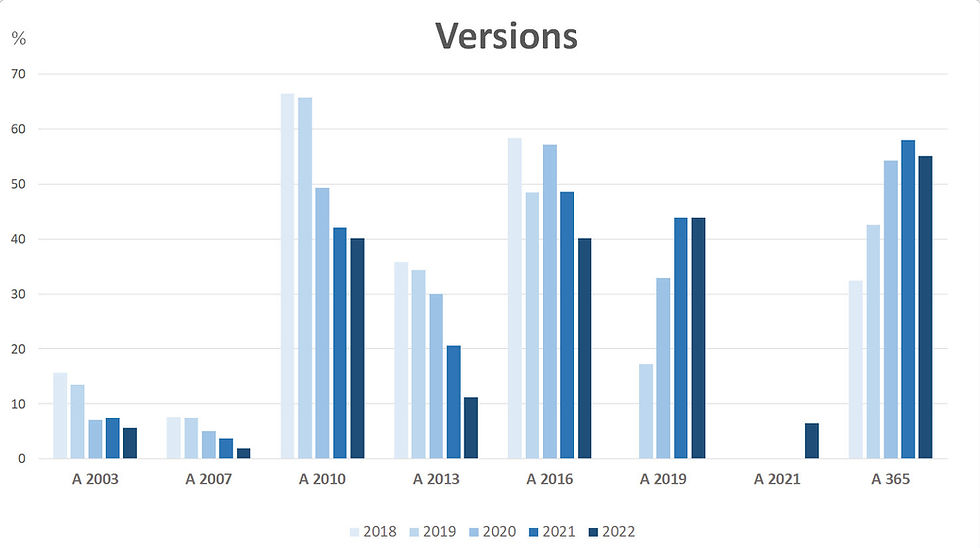Which Access versions do developers use?
- Karl Donaubauer
- Dec 23, 2022
- 2 min read

As an Access developer, you may wonder whether you are mainstream or exotic with the versions you use. At my German Access developer conference AEK, I have been asking the participants for many years which versions they are currently working with. These numbers are useful for assessing the situation and help me to plan the right topics.
Shockingly, not all participants fill out my extensive questionnaires. I do however get answers from 100 to 150 mostly professional developers, depending on the year and how the event is held. Here are the results after AEK24 in October 2022.

The comparison over the last 5 years shows, unsurprisingly, that the older versions tend to decrease and the newer ones tend to increase. On closer inspection, however, one sees e.g., that Access 2010 is holding up as well as Access 2016. It is still used by 40% of developers. (Most developers work with several versions, which is reflected in the chart.) Or that Access 2021 didn't even get off to half as good a start in its first year as Access 2019. The slight dip this year in Access 365 could be a statistical outlier.
Here are the same figures again in a year-on-year comparison.

You can see that the blue bar of Access 365 only took over in 2021. So for the fact that Microsoft has only been promoting this subscription version for many years, it has taken quite a long time. In 2018 and 2019, Access 2010 was still clearly in the lead, in 2020 Access 2016 had taken over, then Access 365.
Another question I ask: What share does Access have in your current database projects, as backend (=data in accdb/mdb) and as frontend?

It's no big surprise that at an Access developer conference, Access as a frontend tool has always been between 80 and 90% over the last 10 years.
The backend value has been between 40 and 50% for many years. This means that even professional Access developers not only use SQL Server for data storage, but ACCDBs or MDBs in almost half of their projects.
This year, for the first time, the value for the backend has fallen significantly below 40%. The question is: Statistical outlier or longer-term effect of the many Access update bugs that make data storage in Access backends increasingly difficult?
Traditionally, no usage statistics are available for Access. Only dubious popularity comparisons of database systems based on Google searches or mentions in forums etc. pop up every now and then. My statistics are based on relatively low user numbers, but the way they are determined over the long term makes them solid. For us Access developers in Central Europe, the results should be quite representative, and I'll just pretend for other parts of the world as well, because no one else has figures to offer anyway. ;-)
In my case, each time I have a new client having a version lower than 2016, I'm telling them it's time to upgrade before I do anything. No one ever told me no. I only have Access 365 install on my computer. We cannot try to convince IT department that Access is well and alive, and in the same time telling them to install a none-supported version of the software!!! Me, I live and die with 365 and bugs. To be honest I rarely get bugs that affect my systems. I think it's because i'm using SQL BE for 90% of my development. If it's an Access backend, I'm trying to have a terminal server installation to be shure the front…
Among others , we use Azure Sql. Works great at the basic trier pricing. Uses can work all over the world with one central database.
Access 2010 is my primary FE development it's fast and stable. I'm using ODBC 18 64bit for SQLExpress 2008 R2 and 2012.
Very interesting. I'm most surprised to see Access 2010 holding steady in 2022 even though it's no longer officially supported by Microsoft.
It doesn't surprise me that A2010 continues to be popular. Its stable and has several features deprecated in later versions. I have a dual install setup with A2010 & 365 and until very recently I used 2010 as my development platform. I recently swopped over because 365 does have a number of new features that do find useful (despite the monthly bugs).
Two related questions if you have the data
How has the split between 32-bit and 64-bit changed in the past few years?
What are the % for the various other platforms being used for BEs?